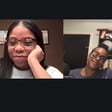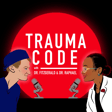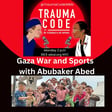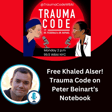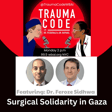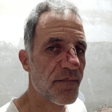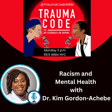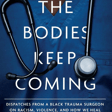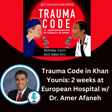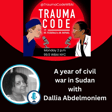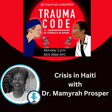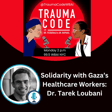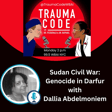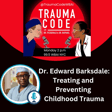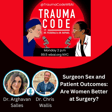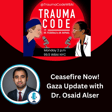Become a Creator today!Start creating today - Share your story with the world!
Start for free
00:00:00
00:00:01

Gaza Sports Update with Abubaker Abed
We call our Gaza sports correspondent Abubaker Abed for his background, a brief history of football in Gaza and a sports update from the ground in Deir al Balah. After this episode was recorded footballer Hamdi Lubbad was killed in Khan Younis and the Lions of Canaan, the Palestine national football team lost 3-1 to Jordan in World Cup Qualifiers in Kuala Lampur.
Music by
Sergio Mendes with the Black Eyed Peas
Mira Craig
Abuntu
Londrelle
Stan Getz and Jiao Gilberto
Transcript
Introduction to 'Trauma Code' and societal wellness
00:00:00
Speaker
WBAI New York 99.5 FM and WBAI.org online. It's now two minutes past 2 p.m. Stay tuned for Trauma Code coming up.
00:00:31
Speaker
Trauma Code to New York City, Trauma Code to WBAI. I am Dr. Simon Fitzgerald, a Brooklyn trauma surgeon and surgical intensivist. And I am Dr. Cassandra Rafael, an adult and child psychiatrist. and Welcome to Trauma Code. Together we will focus on healing of mind, body, and community from trauma. We'll discuss how wellness fits into the culture at large. Join us on Monday at 2 p.m. on WBAI.
00:04:44
Speaker
Welcome back to the trauma code. This
Interview preview and discussion on recent events
00:04:48
Speaker
is Dr. Simon Fitzgerald ah for what's today's date? Monday September 9th and excuse me again I ran two blocks down Atlantic Avenue and up three flights of stairs to get here so I'm a little winded but I'm excited to be with you today and I think we're going to be able to get on the line a journalist from Gaza actually a sports journalist we just recently had our sports show with Terrence Williams um and ah there's a lot to talk about so we're going to see if we can get him on the line and we're going to have a whole sprinkling of music that of course was
00:05:24
Speaker
Sergio Mendez, I guess, collaboration with Black Eyed Peas, the late Sergio Mendez. I think he died maybe even less than a week ago. So just a tip of the hat. And our good friend of the show, Alex Galli, recommended the Sergio Mendez song, I think like a month ago. So we've been playing that recently. It resonated with me when I heard he passed.
00:05:44
Speaker
um And of course the other update last week if you guys were listening I had a recorded episode because I had to work because it was that Labor Day weekend the most busy trauma weekend in Central Brooklyn in a lot of ways and although I was on for Juve which was pretty quiet relatively. ah There was, of course, a mass shooting at the parade just off of Eastern Parkway with at least one fatality. But of course, that's the reality of life in 21st century America, right? There was also a mass shooting at a Georgia high school. There was a mass shooting by someone just shooting onto the highway in Kentucky, running away into the woods, as far as I know, still on the run.
00:06:30
Speaker
um But, you know, that's just the reality when anybody can buy their, you know, mentally ah unwell, belligerent 16-year-old, a semi-automatic AR platform assault rifle, and ah unfortunately the outcome is predictable.
00:06:50
Speaker
But I didn't want to dwell on that too much, but I did want to recognize it since I wasn't here for Labor Day. Obviously a lot of excitement, a lot of music, and unfortunately um too much violence this year. And although it's improved since previous years, a lot of work to be done. But why don't we do this? Let's do a little musical break and let's see if we can get Abu Bakr Abed on on the phone for our Gaza Sports Update.
00:07:28
Speaker
make
00:07:35
Speaker
see
00:07:46
Speaker
you can make
00:09:32
Speaker
Welcome back to The Trauma Code.
Impact of conflict on Gaza's sports and life
00:09:35
Speaker
ah And we're live in studio for September 9th. And I do believe we have the pleasure, the treat. Let's see if we have them on the line. Abu Bakr from Dar, ah ah from sorry, from Gaza. Can you hear us? Are you with us?
00:09:50
Speaker
Yeah, I can hear you now like now. but We hear you too. It's such a pleasure and a privilege to connect ah with friends and colleagues in Gaza right now. um and I know your work. You've told me you've ah written a lot in Arabic, but you've also written quite a bit in English.
00:10:09
Speaker
um in many ah important aspects of life and survival in Gaza over you know your career, including recently with um you know medical students and professionals and highlighting um ah you know civilian survival in Gaza. So first of all, welcome. Thank you for joining us. And since you're on the air with New York City, do you mind introducing yourself? ah And you know where are you? And tell us just a little bit, where did you grow up?
00:10:41
Speaker
Yes, thank you so much for having me. This is sizeable oh this is first of all. ah So, about me, I am a worker of it, living in Delvascara. I am a journalist and commentator, particularly on football.
00:11:06
Speaker
and I have worked in doing this genocide with several media outlets like Al Jazeera, I'm a living star, TOT Word, BBC, and um In fact, I'm a football journalist and commentator, but being a part of this genocide has yeah pushed me and apprised me somehow to cover the war and report to the war because I'm a part of it and I have to defend my people, my own people.
00:11:39
Speaker
So i'm um I'm focusing at the moment to like most of my work is is about football and how we can raise the voice of sports in Palestine in Gaza and talk about the sport in tragedy, try to amplify the voices of our players, our athletes and And the destruction, the massive destruction ah as sports that of or facilities inside the Gaza Strip. I'm still 21 years old. I haven't completed my education. I should have graduated like this month. But unfortunately, my university was reduced to rubble as almost all universities across the Gaza Strip.
00:12:26
Speaker
At the same time, they also have worked to work as, ah you know, as an garbage journalist and writer, but, you know, it's how my, you know, my experiences are just about that, I'm in a conflict of war, and it's been another month, and yes, this is like a walk-in prison.
00:12:53
Speaker
Definitely. And I really appreciate you joining us. I know it's very hard to connect um from Gaza. And we've covered ah the destruction, particularly of the health care infrastructure. um i you know I did some telemedicine support on the phone with Surgeon at Nasser Hospital before it was destroyed and our partners still forcibly disappeared. um And so we' we've been fighting for his release, Dr. Khaled Elsir. So I really appreciate your time.
00:13:19
Speaker
um and And I know there's also been destruction and and targeting of Palestinian journalists, and i and I'm mindful of that. And I want to talk about all this, but I also, when we were talking offline earlier, you told me a story about what it meant for you growing up in Darabala to hear the cheers from the football stadium, from the soccer stadium. Can you tell me a little bit about that? Maybe a story that can explain what, you know, sport meant to you in Darabala in Gaza for, you know, ah the last 20 years of your life?
00:13:50
Speaker
Yes, absolutely. You know, football for all the people in Gaza here means life and still means life despite the current war on Gaza and despite the truly harsh circumstances, they still watch football in tents and in their shelters and in under absolutely dire circumstances. So and during the 20 years where I was raised and born in Darabala in Gaza, ah you know,
00:14:19
Speaker
At weekends, especially Friday and Saturday, you could really hear the loud cheers and the rivery and lots of laughter from fans and the stadiums reacting when it was scored. So there was my life and there was so much, you know,
00:14:44
Speaker
so much joy and entertainment for people here in Gaza. But we want to know, to the same time, I want to know, I want to tell people that our life, even before October the 7th, hasn't been wow, hasn't been the best, because we have been occupied and we have been besieged for the past 17 years because of the imposed Israeli siege in Gaza since 2006.
00:15:12
Speaker
So we were not given us so much entertainment. So we do have such a, you know, such a few outfits like stadiums, summer strength and the sea and the beach. So there was no so much entertainment, but this genocide has erased everything. Now the beach paints a dramatic picture. A lot of people are just based in tents along the seashore, and at the same time all the stadiums have been infiltrated except for the outdoor stadium in the rebellion, which also paints a dramatic picture because it has been turned
00:15:51
Speaker
since the start of the war into a shelter for thousands and thousands of people displaced from the north of Gaza. And at the same time, ah you know, it's like it's telling that many players have been killed, many stadiums have been upgraded. So overall, the image right now is absolutely heartbreaking and the trauma on us that we don't have any means. It's been 11 months, hellish, nightmarish and unbearable.
00:16:21
Speaker
at the same time, so we really can't bear it. And there's no joy, there's no entertainment, but we are despite the circumstances. as We still try to seek out some hope and some distraction, respite from the bombardment, from the harsh life, and from the terrible circumstances. Through football, we find solace in football, and we hope that everything will be normal again very soon, and this genocide ends as soon as possible today.
00:16:51
Speaker
And
Resilience of Gaza's sports community
00:16:52
Speaker
um you know I know there's been stories, for example, of an Israeli strike on a soccer pitch with kids playing that had casualties, and we know about the casualties um in the Syrian Druze community and Golan Heights playing football.
00:17:06
Speaker
um Anything else that you want to say about what sport and love of sport and how people have followed sport in the setting of this really catastrophic violence forcing people from their homes and people losing family members and losing limbs? Anything else you want to say about football or or sport in this moment?
00:17:27
Speaker
Yes, sure. As I told you, the sports have really gone the suffering because it has been absolutely, with no doubts, the most horrific tragedy for sports of across the globe and in all decades because We're talking about more than 300 footballers have been killed in the past including legends like Muhammad Barqati scored 114 goals in Gaza's top leagues and at the same time he is Gaza's first centurion of goals and at the same time he played for Palestine Mission Team and two footballing sites on beach football and pitch football at the same time and and also
00:18:21
Speaker
In addition, we lost many really good players, like from this article, Kieber, of the Matapha Football Club. He really won the last Gaza Premier League title for the Matapha last May of 2023.
00:18:40
Speaker
We also lost Chad Havelar-Wash from a municipal keypad. We also lost lost a very promising manager useful healing on Israeli airstrike. We lost many of many. And regarding athletes, we're talking about more than 450 athletes have been killed. And yes, we're talking also that 45 sports facilities, more than 50 sports facilities have been operated by Israeli forces. Nine stadiums nine out-of-class stadiums have been annihilated by Israeli warplanes and tanks at the same time. And as I'm talking to you, because this is something to the audience, you can hear here the warplanes have her in the sky, the drones have her in the sky. It's all just bleakness and darkness and around.
00:19:37
Speaker
I can see from where I am from the stadium, where there is no light, there is nothing at all. And very important to mention that 84 children who loved football, who dreamed of being such important and famous footballers, who dreamed of being like the role models, like Cristiano Ronaldo and, you know, mostly displays that they have been watching or for so long, like ages ago, who have been killed.
00:20:07
Speaker
Hamlet and Sammy are and six-year-olds also were killed I remember four months seek ago at the same time as they even did not leave for by academies and watch that Academy and a Champions Academy were also destroyed so it's a very very you know we are laid down for association is also weighed down by this tragic you know by this tragic tragedy by this tragic event but yes we are still the war hasn't unfortunately ended
00:20:42
Speaker
We still all lose men and players in a very daily basis. We still lose many fans at the same time because we have we don't have to be numbers. We do have to be people known to the outside world. You make a great point that the violence is ongoing. It hasn't stopped. and And we made the argument, not that anybody was listening, but on this show, on our sports show, that um if a country like Israel or Russia is not willing to recognize an Olympic truce, they shouldn't be able to fly the Olympic flag at the games and that's doubly true when so many athletes are being targeted and killed and that's really the case that has been brought before FIFA which has seemed unwilling to to to seriously um sit with the question and it seems like you know that that's not going to be a possibility that you know
00:21:28
Speaker
um But on the on the kind of on the on the flip side of that, you know you brought up the Palestine national team. And the other thing that's been going on in the last week's month's year has been really ah the impressive performance of the Palestine national football team. And as I understand it, with an expanded um field for Asian teams to make it to the North America World Cup, Palestine has a serious chance of making it to World Cup play in the United States, for example.
00:21:59
Speaker
Anything more? What else can you tell us about the Palestine National Football Team right now? Well, I think, as I told you, that the Palestinian National, the Palestine National Team is playing because they have a message to convey. they are You know, given the ultimate test, they want to one of the test,
00:22:21
Speaker
because they have a message to convey. Football is a means of resistance, football is a means of life, so that's why you can see absolutely high-spirited, strong players on the page giving everything because we can but also can remember that Palestine reached him which was a historic milestone for Palestine when it reached the round 16 in the air. It's the Asian Cup January of this year. So yes, they they play they play because they know the suffering um of our people in Gaza, of the people in Gaza. They put a smile on the faces of
00:23:07
Speaker
everyone here in Gaza by trying to do that very best. And yes, we saw how how well quite it was to get against South Korea, despite the fact that South Korea is a very, very strong team and a tall land and teams. Well, they have a young son from done from big players. So Yes, they want to give a thing, they want to play and advantage for everything. They want to put us by, they want to tell the world that we have, we love life, we love, we teach life and we want to do something that could please our people in Gaza and our people in the West Bank and across the globe at the same time because we love football and because you mentioned Russia and you mentioned this kind of things at the same time,
00:23:59
Speaker
It is completely hypocrittic hypocritical when it comes to this incident because Russia was banned three days after the incidents back in 2022 when it invaded Ukraine. Meanwhile, it's been committing war crimes over the past 76 years and particularly during this side is the side which is continuing, but unfortunately FIFA has been postponing its councils to ban Israel, which is a a deliberate act of allowing Israel to compete in international competitions. And we can see Israel being beaten by Belgium within the Initiatives League, which should not have been applied
00:24:45
Speaker
and it's where you should not compete in international competitions the same for a cyclops so it's completely hypocritical hypocritical and at the same time it exposes it exposes the double standards of FIFA because we guys been calling on the word and everything that football stands together football is for everyone etc so all these campaigns don't work for us so football doesn't stand together um when it comes to Palestine. This racism and discrimination and immunization of Palestinians is absolutely heartbreaking and unbearable. And as you can hear right now, there is a bombing. I think you've heard the sound. It's just a bombing. It's a wider area that is north of Erba. It's just like around 200 kilometers. You can see the smoke. A building has been just bombed.
00:25:41
Speaker
This is a calamity for nothing to do. And if you're just joining us on the trauma code, this is Dr. Simon Fitzgerald, and I'm on the line with our Gaza sports correspondent Abu Bakr Abed from Daraballah in Gaza, who's just been, we've been talking a lot about the ah the toll of the violence as well as the history rich history and tradition of Palestinian sport. And one of the things that we brushed over is the, and and I'm kind of a sports guy too, so I think you'll appreciate this, the you know the the record over the last year or so of the Palestinian national team, they beat teams like Bangladesh that they're supposed to, they beat it beat Hong Kong and the and the Asian Cup, their first win in that tournament.
00:26:29
Speaker
But they've also managed to draw um against sides that in many ways would otherwise be thought to to to outweigh them on an average day, including, as you mentioned, South Korea, which is probably like a second tier team in terms of on the world stage, um always you know threatening to get into the group of 16 and beyond.
00:26:49
Speaker
um So anything else you want to say? The next game is against Jordan. Anything you want to tell us about the players? I've been impressed with the goalie. I think he's been a big part of of why the Palestinian team has has had such a strong defense. Also, I imagine their Tunisia coach must be part of it. You all right? Certainly, because, yeah, yes, it's it's just like, you know, Obama's man, the goalkeeper, is very much experienced goalie. He has been, you know, pressing with the Palestine national team.
00:27:20
Speaker
And yes, we don't think that against children, against other teams coming and becoming games and becoming words called quantifiers, that we know our abilities, we know our capabilities, we know what we are able of. So, ah you know, yeah we want to know and figure out if every game has its own preparations, every game has its own tactics.
00:27:45
Speaker
Yeah, South Korea is a very good attacking team, so we're played defensively because we know our abilities. We know that we cannot, we can just play on the independent counter-attacks to try and break the deadlock against South Korea. So ah what what we needed from this game was just like a draw, an L&L draw. A draw in any way at one point would be a very impressive and a formidable start.
00:28:12
Speaker
to our world top 26 qualifiers and qualifiers campaign. So we play in what we have. We play depending on what we have and and what we can do. Against children, I think we will play more of an attacking football and trying to win this game. So it seems who we are playing against. And yes, just like this, because we have many players,
00:28:41
Speaker
or we might now have a full squad next game. Some players might be injured, some players might be traumatized by the ongoing war on Gaza because they have friends, they have families, they have relatives here in Gaza. So it completely relies on the mental status of these players and on the preparations of these players. So it depends on every game, but I'm sure I'm 100% confident that our players, despite the current circumstances, want to get 100%, want to convey a message that Palestine deserves to be free, that Palestine will be free, that Palestine and and ta like has has so much life, so much hope that it will become a country, a free country, away from occupation and away from humanisation and colonialism and and every and settlement and these things because
00:29:37
Speaker
We have been absolutely the most traumatized people on this earth. We
Call for international support for Gaza
00:29:42
Speaker
are still the most traumatized people on this earth. We are ostracized, we are marginalized, so and unfortunately the Western leaders are licking us down. So we are considering every opportunity of every game. We know our abilities and we want to give 100% hope and that we can make it to the next World Cup 26 in the United States, Mexico, and Canada, and I hope personally to be in this World Cup, commentating or reporting on this World Cup format for past time. I hope so.
00:30:18
Speaker
Well, I look forward to hosting you and seeing you over here. If we can make that happen, definitely. I look forward to it. Abu Bakr Abed, our Gaza sports correspondent. Reggie, why don't you get some music set up for the ah for the transition? But while we have you on the line, Abu Bakr, anything else that you want to tell us either about sports or anything else while you have the ear of New York City?
00:30:41
Speaker
I really urge you all, as as I've been talking here with you, it's my pleasure to talk to you as you can hear how my life is like, how our life, our people's life is like. Look at the terror you're living through. and At any second, a bombing could happen. At any second, you can lose yourself. You can be killed. Your your family can becate you what might may be killed, killed.
00:31:07
Speaker
ah yeah your place might be on So it's just we are living through constant terror, English terror, so terror, so. We need you to understand that our suffering has been absolutely so lengthy and it's unbearable and it's absolutely traumatizing. So we need you to continue to call on your governments and to call on them to stop this genocide because they're not able to bear it anymore. We see hope in you and we hope for that you will make a change and this will end very, very soon. So please,
00:31:44
Speaker
continue boycotting, continue divesting, continue protesting just for the lives, for deep for forget for humanity and for the lives of innocent civilians here.
00:31:55
Speaker
We are all innocent here. This is not something with Hamas. This is a war on children, a war on women, and a war on the Palestinian people, Palestine and the Palestinian people. So please continue your support because your support really, really means a lot to us. And we remind you that our life is hellish. And we remind you that unfortunately that we are absolutely dreaming to live while every human being around the world is living to dream and that is the core difference between us and the world so please we love you and we see helping you so please continue supporting us hind with with will whatever you can and with all you can do.
00:32:43
Speaker
Well, we really appreciate your
How to support Abu Bakr's work
00:32:44
Speaker
time. And definitely from our perspective on this show the the best way to stop the armed violence is to stop arming the violence. And I think until there's complete cessation of violence, there should be absolutely no weaponry sent over there to belligerent parties in ah in in this in this war. So um Abu Bakr, thank you so much for joining us. Last opportunity, do you want to tell our audience how to find your work or how to support your work?
00:33:11
Speaker
if You can really find me on Twitter. a abubahar w a b u b a a key e You tell it a letter that it' by hand can also find my work on Google. So you can find me there.
00:33:33
Speaker
and i also regularly appear on the listening into father lives stream So you can find me what yeah by a sample do the search We'll make sure to link it mostly. We'll make sure to link that in our show notes. So definitely ah you can look up on the WBAR Radio Archive, WBAR Radio Archive, or on our podcast stream, wherever you get yours, we'll link to that in the show notes. Abu Bakr, Abed, thank you for joining us from Daraballah, Gaza, and Palestine. And we'll definitely be in touch. I look forward to seeing you, hosting you for the games here in New York if and New Jersey, if you can make it over.
00:34:09
Speaker
And so I think you're so much is so broken all the best All right
00:34:37
Speaker
If you don't know what you're doing, you'll be fine. If you don't know what you're doing, you'll be fine. If you don't know what you're doing, you'll be fine. If you don't know what you're doing, you'll be fine.
00:35:28
Speaker
Welcome back to The Trauma Code.
Insights into the Israeli-Palestinian conflict
00:35:31
Speaker
This is Dr. Simon Fitzgerald, live in its studio, WBAI in downtown Brooklyn. And you were just listening to an interview live um over the phone, just gave him a call, ah the sports journalist, Abu Bakr Abed from Daraballah, Gaza, giving us our Palestine Sports Update. um And definitely I'll have to link and support his work. um And if you were listening, you know last week, as I mentioned, I had to work in the hospital while the festivities, the Labor Day parade, rest in peace Bob Marley, ah went down Eastern Parkway and and I happened to not be in the hospital. My partners took over when there was a mass shooting. um and And so, um you know, definitely keep that in mind that that violence, arming the violence ah is as big a problem here at times as it is in the Middle East and the answer to stopping armed violence is to stop arming the belligerents.
00:36:24
Speaker
But perhaps we we all know that, um but um in addition, what we had the music just now was Stan Getz, Angel Gilberto, something about that Sergio Mendez vibe, just i one of the algorithms where I kept playing me some Brazilian music and and so I kept um playing it.
00:36:47
Speaker
um But the the other news that came out ah in a way, I was just kind of passively on social media looking at some news and another friend of the show, Yonatan Pollak, Jonathan Pollak, an Israeli, part of the Israeli anarchists against the wall along with my friend um Kobe Snitz, who are founding members of the of that group and and have done for years weekly demonstrations on and off um in support under the leadership of communities in the West Bank who are suffering abuse and land theft.
00:37:25
Speaker
um and things like this, just having an international and an Israeli presence to try to de-escalate the situation and provide ah their their friends and neighbors some protection from a violent ah attacks.
00:37:41
Speaker
on, you know, calls ah for for justice, for for for land, and for, and you know, for peace, basically, in the West Bank. And so I want to play, um if we have, ah can you set up, ah Reggie, I sent you a link, a Jonathan Pollack interview. And what this was about, unfortunately, at one of those protests, um there was an American citizen who was shot and killed. And ah he points out that this is the 17th person killed in this area where they've been fighting their land theft.
00:38:11
Speaker
um And it's not the first American to be shot there. I think ah ah a couple weeks or a month ago, another American was shot and and survived, and it was muted to no response from the American government, and I think that's part of the escalation. And our our friend, our our colleague Comrade, Yonatan Palak, who we've spoken to on this show, was with um the the young um a Turkish-American um whose names in front of me, I can't find it right now, but I'll pick it up and he's going to talk about what he witnessed basically that she was targeted, that it was not an accidental shooting, that this was an assassination of an American peace activist in Bata in the West Bank. Are you ready with that with the link, Reggie? Thank you.
00:39:00
Speaker
What happened today is no accident. It is the continuation of the killing of 17 of Beta's residents during demonstrations since 2021. It is an intentional killing that is now receiving the light of day and enjoy like receiving that receiving the light of day because she is an American citizen.
00:39:26
Speaker
It was an intentional killing that cannot be justified. international My name is Jonathan Pollock. I was there when when she was shot. We got to Beta for the weekly demonstration against the the settlement there. The army was already present where people pray in protest of the of of the settlement. As soon as the prayer ended,
00:39:51
Speaker
clashes ensued and we the the army shot tear gas and live ammunition immediately. We were forced to retreat down towards the village and ended up standing at the at the outskirts of the built-up area of the village about 150-200 meters away from where the soldiers were.
00:40:18
Speaker
We stayed there for about half an hour. Soldiers at some point took over a rooftop that that that has a view of the entire area, including where we were. um It was quiet. There was nothing to justify the shot. The shot was taken to kill.
00:40:45
Speaker
There were two shots fired from the rooftop. I've been doing this for 20 years. I know the difference in sound between tear gas, rubber-coated bullets, live ammunition. These were two separate shots of live ammunition shot one after the other. The first one hit the middle object.
00:41:05
Speaker
And then a young a young man from the village in his spine. And then I heard another shot. And then I heard people calling my name in English.
00:41:17
Speaker
Saying we need help we need help come help us I ran over there about 10 or 15 meters behind me farther away from the soldiers Into the olive groves. ah She was I found her lying on the ground beside the tree Bleeding from her head. I Put my I put my hand under her head to try and stop the bleeding. I took her pulse. She had a very weak pulse. We called the ambulance. From there, we evacuated her to the the village's medical center where the doctor came into the ambulance and continued into the to the hospital where they tried to resuscitate her but failed.
00:42:09
Speaker
Oh, that was just a friend of the show, Yonatan Pollock, sometimes goes by Jonathan Pollock, about the American, um' I'm going to mispronounce it because I don't know Turkish, but Aisinor Egi, who was ah killed with a shot, I believe, to the head, but what is described but as a kill shot by Our friend and colleague Yona Tampaulik who was present when she was killed and there's probably people who don't know me terribly well and and Listen to to some of the programs and think I have a bias against Israelis and you know, I i actually speak To some Israelis quite frequently They tend to be either surgeons or anarchists um but this is ah a friend of mine and what they're doing in Israel right now if you're willing to stand up against a violence it's a dangerous thing to do right now in the holy land and uh... i wanted to acknowledge and listen to our friend unit on pollock as he's basically bearing witness uh... to the violence uh... which uh... in many ways is intentionally kind of spreading from gaza into the west bank even in terms of changes in policy uh... so uh... it it would uh...
Supporting 'Trauma Code' and future topics
00:43:16
Speaker
i think be necessary to to pay attention to that
00:43:19
Speaker
um Let's see, we have a a little bit of time left on the show and and if you appreciate us, we appreciate you definitely. We can't do this without your support. I would not have the reach and the platform to call up a ah colleague or Gaza sports correspondent and do that kind of thing on any other radio show that radio station that I know of.
00:43:39
Speaker
So definitely, if you want to support what we're doing, you can go online at wbai.org or give to wbai.org. We appreciate your support. Be a BAI buddy. um and And definitely, if you've only caught part of that and want to look it up, definitely I'll release later today in your podcast feed, under trauma code, wherever you get yours, you can look it up as soon as this show is over on the WBAI website. radio archives, and ah Reggie, do you have any more music queued up? Let's have a little musical break before we round out the show.
00:45:06
Speaker
I come from a city where it's really hard I'm really from them projects, when I got I really seen them dead bodies off in the alley Real talk, no cabin, it really happened I left my soul, when they murdered my daddy Mama so cray, ain't even bragging Whole life been drama oh life
00:45:40
Speaker
to the trauma code. that This is Dr. Simon Fitzgerald live in the studio and that was Laundrell stay free. I've been feeling That a little bit is, ah you know, we've been fighting for our partner, our colleague, the surgeon, ah Dr. Khaleda Sur, who was basically the trauma surgeon, the head of the trauma team at Nasser Hospital in February when it was laid siege, attacked, bombed, isolated, and ultimately on March 25th, our partner, our colleague, Dr. Khaleda Sur, was forcibly disappeared from Nasser Hospital and and we suspected that
00:46:17
Speaker
and we basically know that we have a confirmation now uh... from a report from israeli physicians for human rights who've been uh... to their credit getting representatives lawyers into to see and speak with um... detainees uh... who have been disappeared into black sites um... to get some proof of life uh... which we've
Preview of future discussions on regional issues
00:46:37
Speaker
had uh... in july no no word of dr collard ausser's condition since then um And so we've been trying to escalate a campaign to win his freedom and and he's the first author on a paper that just published like a week and a half ago in The Lancet, one of the top five probably medical journals in the world, ah describing our process and our patients as we tried to help him and Oster Hospital take care of difficult tsunami of trauma patients and ultimately as we kind of bear witness as a sort of
00:47:12
Speaker
a forensic anthropology on WhatsApp as we witness him being taken prisoner and we're we're still fighting for his freedom and I think that's going to be an ongoing theme until we're able to to see him and speak with him and and and hopefully help him rebuild Nassau Hospital at some point in the future. um But as we round out the show, oh and and I forgot to even mention the song earlier, Mira Craig's oh
00:47:43
Speaker
Who Make You? Definitely. Some music recommended by our co-host who could not be in studio today, Dr. Cassandra Raphael, definitely always feel and hear her influence with the music, which is probably half at least of her influence. um And as we round out the show on another topic that I'm hoping to draw attention to in the near future, I've reached out um to ah to Sudanese physicians as well as Sudanese kind of historians and and and academics knowledgeable about African art and and the collection of the sodan Sudan National Museum, which was recently looted by the the RSF and in that civil war, the genocidal violence in Darfur, how that spilled over into the entire country.
00:48:31
Speaker
and led to the looting of the National Museum and even some of this stuff is being sold on eBay and in other places. um So hopefully maybe in the next week or couple of weeks have some people on to update us and talk about what's going on in Sudan. We'll keep our eye there as well. Why don't we set up a little bit more music, I think some African music while we get ready to round out the show. Thank you for joining us New York and don't forget to support at WBAI.org.
00:50:31
Speaker
Thank you for joining us, New York. That was just a boon to Piano City. And if you listened to today's show, you heard us interview our Gaza sports correspondent Abu Bakr Abed from Daraballah in Gaza. You can definitely find that if you missed it on ah the WBAI radio archives or wherever you get your podcasts. and definitely support the station at WBAI.org so we can do what we do and broadcast it ah to the five boroughs and beyond. And thank you, as always, Reggie, for holding it down. You have a show tonight at midnight? Want to tell us what to expect? Yeah, yeah, yeah. It's been a series um ah that I've been presenting since the beginning of
00:51:14
Speaker
August and I've been presenting these classes um organizing and talking about ah revolution and the history of revolution and the future of revolution presented by the People's Forum and this week I'm going to be presenting a class um that is titled Prospects for Revolution in the United States and it's all connected and it's all related to what you was talking about during this hour and what I've been doing since October of last year. So yeah. Definitely. Well thank you again for joining us New York and why don't we round out the show with just a little more music and definitely while you're enjoying it go online www.wbai.org. Help us do what we do. Thank you for listening New York City.
00:53:12
Speaker
For
News updates on global events
00:53:13
Speaker
WPFW News in Washington and WPAI in New York, I'm Sue Goodwin. Today is Monday, September 9. Here are some headlines. A wildfire in Southern California more than quadrupled in size over the weekend forcing evacuation for more than 11,000 people and threatening thousands of structures. By Sunday night, the blaze known as the lined fire had burned more than 20,000 acres following a day when the temperature climbed above 100 degrees as part of a dangerous heat wave. As of this morning, the fire was 3% contained.
00:53:55
Speaker
Meanwhile, the late summer heat wave is raising the risk of more fires. There are 14 active wildfires currently burning across California. And while each wildfire cannot automatically be linked directly to climate change, scientists say that climate change is making weather conditions like heat and drought that lead to wildfires more likely.
00:54:21
Speaker
In other news, the federal trial of three former Memphis police officers involved in the death of Tyree Nichols began today with jury selection. Nichols was stopped in January 2023 by the officers for an alleged traffic violation. After being pulled from his car, Nichols was brutally beaten in an assault that was caught on video and later released to the public.
00:54:49
Speaker
Nichols died from his injuries three days later. His death sparked national outrage as demonstrators across the country denounced police brutality. The three police officers have pleaded not guilty to depriving Nichols of his rights through excessive force, failing to intervene, and obstructing justice through witness tampering.
00:55:15
Speaker
A second antitrust trial against Google began today in federal court in Virginia. The Justice Department and a coalition of 17 states claim that Google maintains a monopoly over the technology that matches online publishers to advertisers, leading to an unequal field for their competitors, and higher ad prices for customers.
00:55:40
Speaker
In a statement published late last year, the company said, quote, no one is forced to use our advertising technologies. They choose to use them because they're effective, close quote. This is Google's second antitrust trial in less than a year. In August, a federal judge ruled that Google had illegally maintained a monopoly in online search.
00:56:06
Speaker
And, as Israel's war on Gaza enters its twelfth month, Gaza's health ministry said today that the number of Palestinians killed is just under 41,000. Israel killed at least eight Palestinians Saturday in an air strike on a school housing displaced people in the Jabalia refugee camp.
00:56:30
Speaker
In more news from the region, the UN Special Rapporteur on the right to food has accused Israel of carrying out it a starvation campaign in Gaza. The UN's World Food Programme warns that 2.2 million Palestinians in Gaza remain in urgent need of food and humanitarian aid.
00:56:53
Speaker
Meanwhile, the White House is reassessing its strategy for a hostage release and ceasefire deal, as President Biden's top aides deliberate on whether there is a point in presenting a new proposal as Hamas and Israel both take tougher positions in negotiations.
00:57:14
Speaker
U.S. Secretary of State Antony Blinken and CIA Director Bill Burns said in recent days that the U.S. could present a new and updated proposal in the coming days, but other U.S. officials say such a move isn't imminent amid doubt that a new proposal could move negotiations any further.
00:57:39
Speaker
For WPFW
